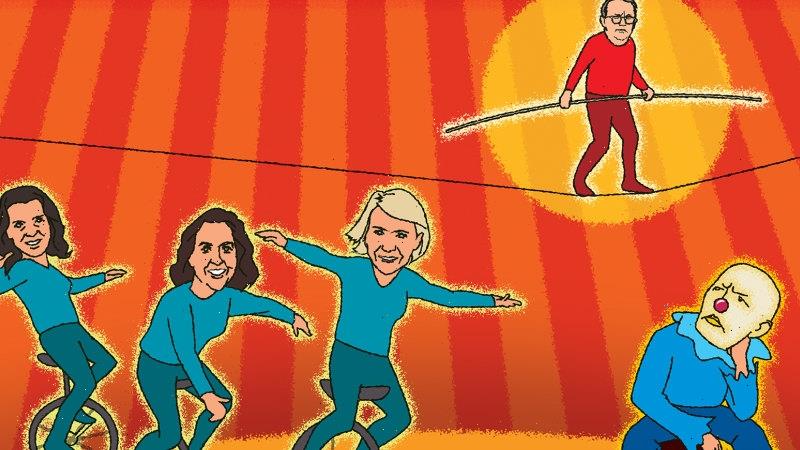
Why Albanese needs to get real on tax cut talk
08/14/2022Last Thursday, the ABC’s Patricia Karvelas asked the Treasurer, Jim Chalmers, whether he thought the stage 3 tax cuts – the ones that are absurdly generous to richer Australians – were needed. Chalmers began to give his usual answer, that the tax cuts are already legislated. Karvelas repeated her actual question: Were they needed? Chalmers said: “If we didn’t think they were, we’d have a different approach to it.”
This is something Chalmers is not usually forced to say. And you can understand why he tries to avoid saying it, given that, in 2019, asked about the tax cuts – when they were not entirely legislated and the Labor opposition had not yet finalised a position – he said: “If even one thing – one prediction, one assumption – does not materialise in the way the budget hopes, they are in trouble. Even if things hold up, the last stage of tax cuts can only be funded by budget cuts.” Given events since then – a pandemic, a budget with a huge hole – this argument against the cuts is even more persuasive now.
Illustration by Jim Pavlidis.Credit:The Age
Which is part of the reason, you have to assume, that Chalmers usually sticks with the simpler formulation, that they have already been legislated, as Anthony Albanese has. The line makes no sense. It is an argument for eternal government inaction. Worse, it is a version of – and a legitimation of – the ridiculous line adopted by many businesses in recent years: “sovereign risk!” they cry, whenever a government changes anything at all.
Governments are allowed to change things. In some quarters, governments changing things is even looked on kindly. (It’s worth noting that Albanese’s last iteration of this line, that the end of pandemic leave payments should be left in place because the decision had been inherited from the last government, lasted about a week.)
There is a more purely logical problem with the argument. Its implication is that the parliament is so powerful that, once done, its work cannot possibly be undone. But if the parliament is so powerful, surely it can do whatever it likes? And if it can’t, doesn’t that make it impotent? Which is it?
A similar confusion was present in the strange debate surrounding the government’s legislation of new climate targets. Before it was passed in the House, the government made much of the fact it did not, in fact, need the legislation. After the legislation was passed, the government said how important it was. If this was slightly confusing, it had nothing on the Coalition’s absurd approach.
Peter Dutton’s main objection, for much of the debate, seemed to be to the mere fact of legislating something. Yes, the target itself was a problem, but the biggest problem was the idea a government wanted to pass a law. This was obviously silly. Interestingly, though, it mirrored the confusion in Labor’s argument. Dutton was both suggesting the legislation was important enough to be blocked, and that the reason to block it was that it was trivial.
Then there is the make-up of the parliament itself. The teal and Green MPs are certainly the most dramatic story of the past election. It is not clear, yet, whether their presence represents a tipping point in our politics – what author Tim Dunlop has described as a possibly permanent “shift to a ‘third force’ in Australian politics” – or simply a temporary, visceral reaction to Scott Morrison.
But this symbolic importance – as the possible representatives of a seismic shift in voters’ attitudes – is at odds with the amount of legislative power these new MPs have in the House, which is close to none. How much attention should they get?
If this is a tricky question for the media, the government, at least, has decided to give some of them – the teals – quite a bit. The conventional wisdom is that this is because Albanese wants them to win again, depriving the Liberals of seats.
This is probably right, but the other reason, I suspect, lies in their symbolic power. Each time he gets their vote he sends a message to voters that he is part of the emerging sensible centre; that the weight of reasonable opinion has moved away from the Coalition. This is power too.
Is the parliament important or unimportant? Is the parliament a symbol, or a body with a practical operation as a venue for accountability and the passage of important legislation? Are the teals historically important or the product of a moment? The answer to all of these may be “both”, and that is fine. What the government must avoid is running from one extreme to the other depending on circumstance.
It is often said, reasonably enough, that Scott Morrison had contempt for parliament. That was true, but what was particularly egregious was the way his public approach chopped and changed. When he needed the parliament to seem important, he said it was; when he lost a vote, or when it tried to hold him to account, he was happy to dismiss it. This undermined the parliament; unfortunately for him, it undermined Morrison too.
Much of the government’s impact so far has come from symbols: speeches, meetings, and, yes, parliament. A paradox for Albanese is that, while he is quite good at the symbolic work of politics, his political appeal rests on seeming to be someone who does not grandstand, who is less concerned with image and more with quiet action.
The stage 3 tax cuts occupy interesting ground. It is clear Albanese sees them partly as symbolic: a part of his pact with the Australian people to deliver his election promises. The problem with the cuts, though, is mostly practical: they are poor policy, hurting the budget for little point, spending money in the wrong place.
To say that they are “already legislated” gives them a mythic, symbolic status they do not deserve. If the government is considering scrapping them, as it should be, then it must work to shift the discussion to more practical ground.
The Opinion newsletter is a weekly wrap of views that will challenge, champion and inform. Sign up here.
Most Viewed in Politics
From our partners
Source: Read Full Article


